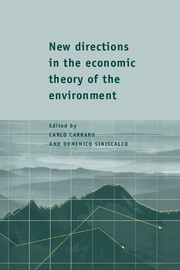Book contents
- Frontmatter
- Contents
- List of contributors
- 1 Theoretical frontiers of environmental economics
- 2 Growth with natural and environmental resources
- 3 Environmental policy and technological innovation
- 4 Environmental policy, distortionary labour taxation and employment: pollution taxes and the double dividend
- 5 International coordination of environmental taxes
- 6 Environmental policy and international trade
- 7 Environmental regulation and international capital allocation
- 8 Towards a theory of international environmental cooperation
- 9 Group formation in games without spillovers
- 10 Non-cooperative models of coalition formation in games with spillovers
- Index
2 - Growth with natural and environmental resources
Published online by Cambridge University Press: 11 January 2010
- Frontmatter
- Contents
- List of contributors
- 1 Theoretical frontiers of environmental economics
- 2 Growth with natural and environmental resources
- 3 Environmental policy and technological innovation
- 4 Environmental policy, distortionary labour taxation and employment: pollution taxes and the double dividend
- 5 International coordination of environmental taxes
- 6 Environmental policy and international trade
- 7 Environmental regulation and international capital allocation
- 8 Towards a theory of international environmental cooperation
- 9 Group formation in games without spillovers
- 10 Non-cooperative models of coalition formation in games with spillovers
- Index
Summary
Introduction
Exploitation of natural resources and environmental assets is a dynamic process, given that utilisation and (spontaneous or induced) regeneration flows affect the quantity and/or the quality of the stock. Optimal exploitation of natural and environmental resources has therefore to be forwardlooking, as economic agents need to take into account the consequences of economic activity on the future availability of resources. However, devising optimal exploitation plans is in practice an enormous challenge, due to incomplete information (e.g., about models of the interrelationships among economic and ecological subsystems), genuine uncertainty (e.g., about the possibility of a future climate change or about future environmental policies or technologies) and international links (in the case of uniformly mixing pollutants like CO2, policies decided by one country in isolation from the international community may not be effective).
Devising optimal exploitation plans is an enormous challenge also in theory. Of course, there are several reasons why it is important to perform a theoretical study of the relationship between economic activity and the use of resources: it may be a source of inspiration for empirical models aimed at building quantitative tools assisting policy makers in the creation of economic and environmental policies (many large-scale econometric models based on optimising agents for studying demand for resources are nowadays based on the assumptions of intertemporal maximisation); it may enlarge the range of phenomena considered by economists, for example to take into account variables that are fundamental to issues of sustainability of growth and its compatibility with the environment, like the laws of thermodynamics and population, and may motivate economists to devote more attention to the analysis of complex systems.
- Type
- Chapter
- Information
- Publisher: Cambridge University PressPrint publication year: 1997
- 9
- Cited by

